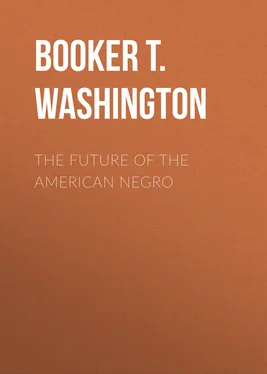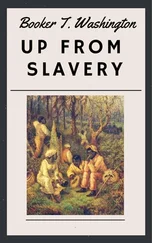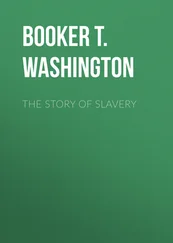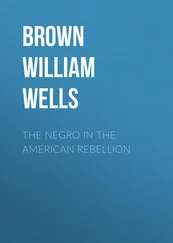Booker T. Washington - The Future of the American Negro
Здесь есть возможность читать онлайн «Booker T. Washington - The Future of the American Negro» — ознакомительный отрывок электронной книги совершенно бесплатно, а после прочтения отрывка купить полную версию. В некоторых случаях можно слушать аудио, скачать через торрент в формате fb2 и присутствует краткое содержание. Жанр: foreign_prose, История, foreign_edu, foreign_antique, на английском языке. Описание произведения, (предисловие) а так же отзывы посетителей доступны на портале библиотеки ЛибКат.
- Название:The Future of the American Negro
- Автор:
- Жанр:
- Год:неизвестен
- ISBN:нет данных
- Рейтинг книги:3 / 5. Голосов: 1
-
Избранное:Добавить в избранное
- Отзывы:
-
Ваша оценка:
- 60
- 1
- 2
- 3
- 4
- 5
The Future of the American Negro: краткое содержание, описание и аннотация
Предлагаем к чтению аннотацию, описание, краткое содержание или предисловие (зависит от того, что написал сам автор книги «The Future of the American Negro»). Если вы не нашли необходимую информацию о книге — напишите в комментариях, мы постараемся отыскать её.
The Future of the American Negro — читать онлайн ознакомительный отрывок
Ниже представлен текст книги, разбитый по страницам. Система сохранения места последней прочитанной страницы, позволяет с удобством читать онлайн бесплатно книгу «The Future of the American Negro», без необходимости каждый раз заново искать на чём Вы остановились. Поставьте закладку, и сможете в любой момент перейти на страницу, на которой закончили чтение.
Интервал:
Закладка:
The time has come, it seems to me, when in this matter we should rise above party or race or sectionalism into the region of duty of man to man, of citizen to citizen, of Christian to Christian; and if the Negro, who has been oppressed and denied his rights in a Christian land, can help the whites of the North and South to rise, can be the inspiration of their rising, into this atmosphere of generous Christian brotherhood and self-forgetfulness, he will see in it a recompense for all that he has suffered in the past.
CHAPTER III
In the heart of the Black Belt of the South in ante-bellum days there was a large estate, with palatial mansion, surrounded by a beautiful grove, in which grew flowers and shrubbery of every description. Magnificent specimens of animal life grazed in the fields, and in grain and all manner of plant growth this estate was a model. In a word, it was the highest type of the product of slave labor.
Then came the long years of war, then freedom, then the trying years of reconstruction. The master returned from the war to find the faithful slaves who had been the bulwark of this household in possession of their freedom. Then there began that social and industrial revolution in the South which it is hard for any who was not really a part of it to appreciate or understand. Gradually, day by day, this ex-master began to realise, with a feeling almost indescribable, to what an extent he and his family had grown to be dependent upon the activity and faithfulness of his slaves; began to appreciate to what an extent slavery had sapped his sinews of strength and independence, how his dependence upon slave labour had deprived him and his offspring of the benefit of technical and industrial training, and, worst of all, had unconsciously led him to see in labour drudgery and degradation instead of beauty, dignity, and civilising power. At first there was a halt in this man's life. He cursed the North and he cursed the Negro. Then there was despair, almost utter hopelessness, over his weak and childlike condition. The temptation was to forget all in drink, and to this temptation there was a gradual yielding. With the loss of physical vigour came the loss of mental grasp and pride in surroundings. There was the falling off of a piece of plaster from the walls of the house which was not replaced, then another and still another. Gradually, the window-panes began to disappear, then the door-knobs. Touches of paint and whitewash, which once helped to give life, were no more to be seen. The hinges disappeared from the gate, then a board from the fence, then others in quick succession. Weeds and unmown grass covered the once well-kept lawn. Sometimes there were servants for domestic duties, and sometimes there were none. In the absence of servants the unsatisfactory condition of the food told that it was being prepared by hands unschooled to such duties. As the years passed by, debts accumulated in every direction. The education of the children was neglected. Lower and lower sank the industrial, financial, and spiritual condition of the household. For the first time the awful truth of Scripture, "Whatsoever a man soweth, that shall he also reap," seemed to dawn upon him with a reality that it is hard for mortal to appreciate. Within a few months the whole mistake of slavery seemed to have concentrated itself upon this household. And this was one of many.
We have seen how the ending of slavery and the beginning of freedom produced not only a shock, but a stand-still, and in many cases a collapse, that lasted several years in the life of many white men. If the sudden change thus affected the white man, should this not teach us that we should have more sympathy than has been shown in many cases with the Negro in connection with his new and changed life? That they made many mistakes, plunged into excesses, undertook responsibilities for which they were not fitted, in many cases took liberty to mean license, is not to be wondered at. It is my opinion that the next forty years are going to show by many per cent. a higher degree of progress in the life of the Negro along all lines than has been shown during the first thirty years of his life. Certainly, the first thirty years of the Negro's life was one of experiment; and consequently, under such conditions, he was not able to settle down to real, earnest, hard common sense efforts to better his condition. While this was true in a great many cases, on the other hand a large proportion of the race, even from the first, saw what was needed for their new life, and began to settle down to lead an industrious, frugal existence, and to educate their children and in every way prepare themselves for the responsibilities of American citizenship.
The wonder is that the Negro has made as few mistakes as he has, when we consider all the surrounding circumstances. Columns of figures have been gleaned from the census reports within the last quarter of a century to show the great amount of crime committed by the Negro in excess of that committed by other races. No one will deny the fact that the proportion of crime by the present generation of Negroes is seriously large, but I believe that any other race with the Negro's history and present environment would have shown about the same criminal record.
Another consideration which we must always bear in mind in considering the Negro is that he had practically no home life in slavery; that is, the mother and father did not have the responsibility, and consequently the experience, of training their own children. The matter of child training was left to the master and mistress. Consequently, it has only been within the last thirty years that the Negro parents have had the actual responsibility and experience of training their own children. That they have made some mistakes in thus training them is not to be wondered at. Many families scattered over all parts of the United States have not yet been able to bring themselves together. When the Negro parents shall have had thirty or forty additional years in which to found homes and get experience in the training of their children, I believe that we will find that the amount of crime will be considerably less than it is now shown to be.
In too large a measure the Negro race began its development at the wrong end, simply because neither white nor black understood the case; and no wonder, for there had never been such a case in the history of the world.
To show where this primary mistake has led in its evil results, I wish to produce some examples showing plainly how prone we have been to make our education formal, superficial, instead of making it meet the needs of conditions.
In order to emphasise the matter more fully, I repeat, at least eighty per cent. of the coloured people in the South are found in the rural districts, and they are dependent on agriculture in some form for their support. Notwithstanding that we have practically a whole race dependent upon agriculture, and notwithstanding that thirty years have passed since our freedom, aside from what has been done at Hampton and Tuskegee and one or two other institutions, but very little has been attempted by State or philanthropy in the way of educating the race in this one industry upon which its very existence depends. Boys have been taken from the farms and educated in law, theology, Hebrew and Greek,—educated in everything else except the very subject that they should know most about. I question whether among all the educated coloured people in the United States you can find six, if we except those from the institutions named, who have received anything like a thorough training in agriculture. It would have seemed that, since self-support, industrial independence, is the first condition for lifting up any race, that education in theoretical and practical agriculture, horticulture, dairying, and stock-raising, should have occupied the first place in our system.
Читать дальшеИнтервал:
Закладка:
Похожие книги на «The Future of the American Negro»
Представляем Вашему вниманию похожие книги на «The Future of the American Negro» списком для выбора. Мы отобрали схожую по названию и смыслу литературу в надежде предоставить читателям больше вариантов отыскать новые, интересные, ещё непрочитанные произведения.
Обсуждение, отзывы о книге «The Future of the American Negro» и просто собственные мнения читателей. Оставьте ваши комментарии, напишите, что Вы думаете о произведении, его смысле или главных героях. Укажите что конкретно понравилось, а что нет, и почему Вы так считаете.










